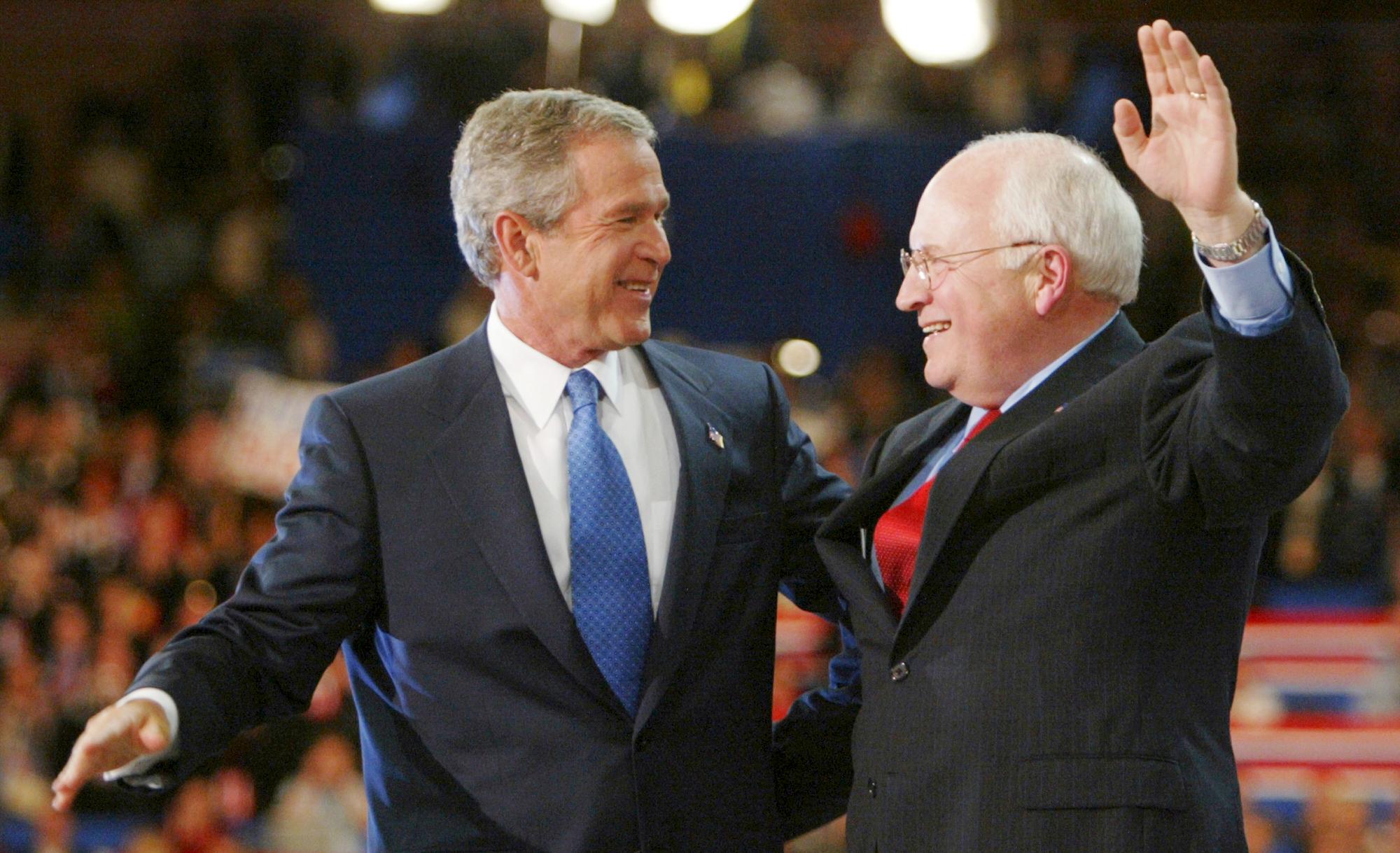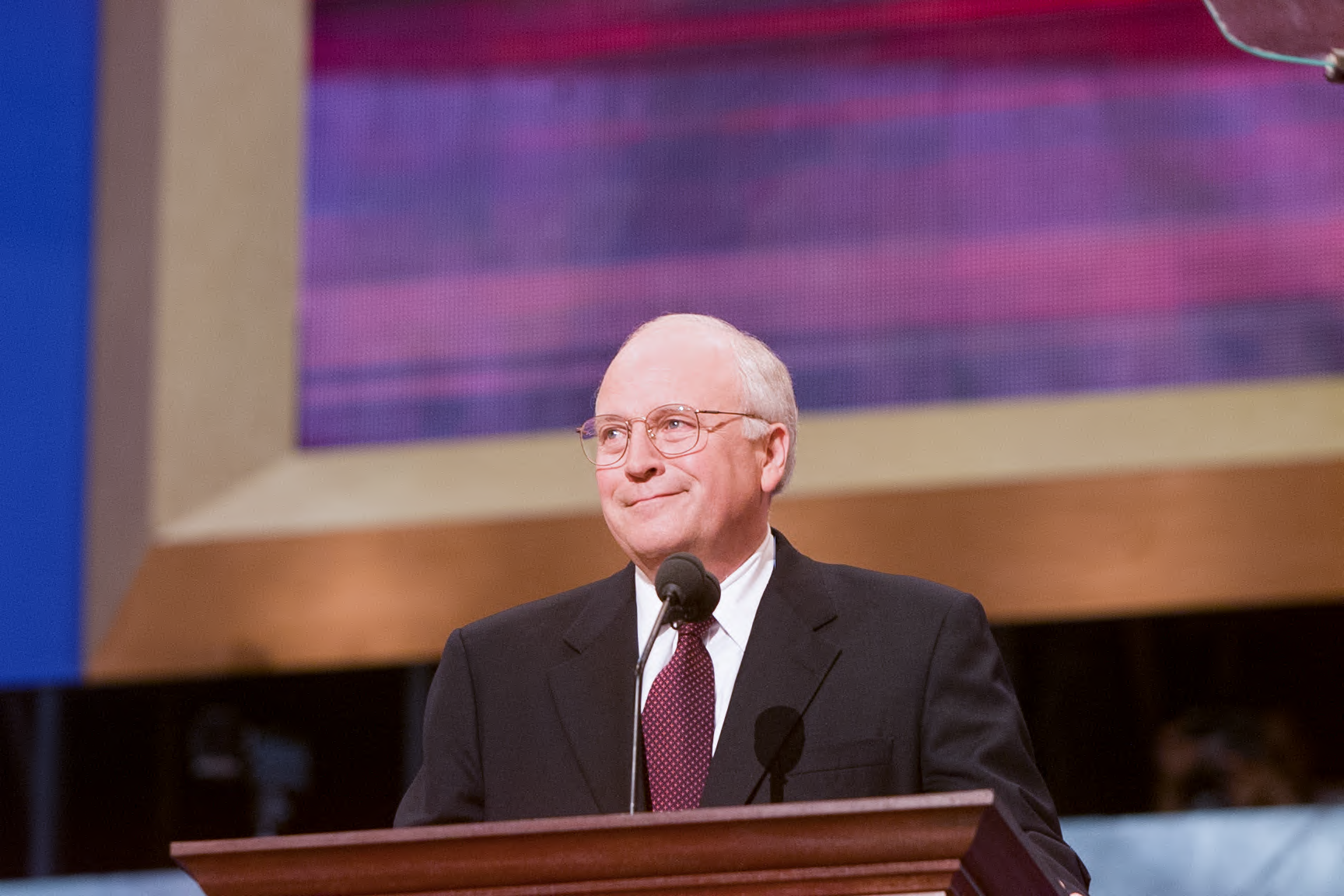There was a time in Washington, not so long ago, when a third-level staffer at an interagency meeting could stop White House policy deliberations cold with eight words: “The vice president will not agree to this.”
Such was the stroke of Richard Bruce Cheney, America’s 46th vice president, by far the most experienced and arguably the most influential occupant of an office traditionally considered a backwater. Cheney died on Monday at the age of 84, a victim of the heart disease that had plagued him for years.
Fifty years prior, Cheney became the youngest White House chief of staff in history at the age of 34. He’d go on to become a six-term Wyoming congressman and secretary of Defense, making him an unusually well prepared second fiddle. As VP, he relentlessly—critics argued, ruthlessly—leveraged that vast knowledge of Washington power dynamics to emerge as an unusually effective force in the eight years he served under George W. Bush.
Ironically, despite his deep antipathy to Donald Trump’s presidency, Cheney’s blunt and vocal cheerleading for a muscular expansion of presidential authority at the expense of Congress and the Supreme Court might be considered a blueprint for Trump’s playbook.
“He’s our chief policy officer,” a fellow power player explained toward the end of Bush’s first year. “The place where politics and policy meet is at Dick Cheney’s desk.”
To buttress his clout, Cheney placed so many of his allies throughout senior echelons of the administration—often below the radar—that West Wing aides quietly muttered that a shadow government had emerged at State, Defense, the CIA, and other power centers of the administration.
“He cares zero about the limelight,” the Bush official added. “He’s the guy who can boil all the pros and cons down to the two-sentence kind of advice every president needs.”
By all accounts, Cheney was the indispensable man in the first Bush term, and despite his long history of heart ailments, there was no consideration given to replacing him for the 2004 campaign.
He was the first to admit he wasn’t much of a retail politician. “I’m not good at working crowds, and I’m not a baby kisser, either,” he once confessed. Nevertheless, he was a big-time player in that campaign; instead of being relegated to second-tier media markets like most running mates, he was one of the campaign’s not-so-secret weapons with traditional GOP conservatives and independents.
“What President Bush loves about Dick is not only his experience and his knowledge, but his discretion,” then-Rep. Rob Portman observed in 2004.
In the second Bush term, Cheney’s influence notably waned. Insiders whispered that Bush had reluctantly concluded Cheney’s agenda wasn’t always in sync with his own priorities. The VP’s ardent defense of domestic surveillance activities, waterboarding, and other harsh interrogation techniques against suspected terrorists was unpopular. His insistence that Iraq had obtained weapons of mass turned out to be unproven.

Suddenly, intramural battles where Cheney once prevailed were now being won by Secretary of State Colin Powell and National Security Adviser Condoleezza Rice.
“It’s been a long time since I’ve heard the president say, ‘Run that by the vice president’s office,’” a senior White House official observed. “You used to hear that all the time.”
Presidential watchers thought it particularly telling that Bush 43 decided to replace Defense Secretary Donald Rumsfeld, Cheney’s powerhouse mentor, without consulting the veep first.
“Dick Cheney I don’t know anymore,” Brent Scowcroft, one of Cheney’s closest friends and ideological soulmates, lamented in 2006.
“I love Dick,” another longtime conservative comrade-in-arms mused, “but he’s gotten so damn dark.”
Even George H.W. Bush, who named Cheney SECDEF in 1989, complained to biographer Jon Meacham in 2015 that Cheney had become “very hard-line and very different from the Dick Cheney I knew and worked with. … Just iron-ass.”
What ultimately ruptured the Bush-Cheney relationship was the 2007 conviction of chief Cheney whisperer Lewis "Scooter" Libby on perjury and obstruction charges involving the leaking of CIA officer Valerie Plame’s identity.
Bush commuted Libby’s jail sentence but refused to pardon him. Cheney was enraged, besieging Bush repeatedly to change his mind. Their confrontations became so tense that Bush finally told his staff to keep Cheney out of the Oval Office and stop putting through his phone calls.
Once Bush and Cheney left office in January 2009, they essentially went their separate ways; aides say the Libby furor was the primary factor. “The relationship is polite and friendly, but they don’t talk much,” a close Bush friend delicately noted four years ago. “There’s not a lot in common. The breach never healed.”
Their estrangement is all the more ironic because Cheney was the rare case of a vice president actually helping his running mate get elected. As Texas governor, Bush was an unknown quantity with scant foreign policy experience. Cheney’s sense of gravitas, foreign policy pedigree, and decades of federal service were the perfect complement.

Early in Cheney’s career, as Gerald Ford’s chain-smoking White House chief of staff, he kept a scrupulously low profile. “Washington is a place where when you raise your head it gets shot off,” he explained.
Garrulous, self-deprecating, and approachable, he cultivated excellent media relations. He never talked out of school or spilled his guts; after a frustrated reporter vowed he’d extract a nugget from him some day, Cheney deadpanned, “Good luck.”
But he tried to steer journalists off stories he knew were wrong. “If you write that,” he warned a newsmagazine reporter on deadline, “you’re gonna look like the stupidest reporter in Washington Monday.”
In sharp counterpoint to his Darth Vader image, he had a winning sense of humor. During the 1976 Illinois primary slugfest between President Ford and Ronald Reagan, Cheney was the chief unindicted co-conspirator in a scheme to smuggle a sheep into a reporter’s room at the Peoria Hilton. The Secret Service wasn’t thrilled, but it stood down after Cheney advised them that Ford himself thought it was a splendid prank.
As his cardiac function deteriorated, Cheney was equipped with a cumbersome, battery-operated heart pump to stay alive. In May 2011, friends were shocked at how frail he looked during the unveiling of a statue of Ford in the Capitol Rotunda.
He was short of breath, and the trademark laconic smile pals called “the Cheney smirk” had disappeared. At one point he became visibly agitated when separated from his daughter Mary, who carried a backup set of batteries.
A year later, one of his oldest political allies dropped by for a visit at Cheney’s home in McLean, Virginia. “He looked like a mechanical man,” the friend shuddered, “stretched out on a couch and having trouble breathing. I thought he was terminal.”
In fact, he was. Two months later, however, Cheney received a heart transplant at the age of 71. The donor heart kept him alive for an unusually long 13 years. The color returned to his pallid face, he was able to hunt, fish, and travel again, and a semblance of normalcy resurfaced, despite what he later described as the most difficult period of his life.
“I couldn’t even take a shower without somebody helping me,” he grimly told National Journal a few years later. “But without that pump, I wouldn’t be here today.”
Even with his dramatic new lease on life, Cheney’s physical condition again began to deteriorate. Some of his closest political allies grew alarmed their old pal wasn’t returning their phone calls or emails. As it turned out, he couldn’t.
“He’s never failed to call me back,” one of Cheney’s most trusted allies noted two years ago. “That’s just not Dick. I hate to say it, but he’s probably sicker than we think.”
This past spring, his former boss George W. Bush telephoned Cheney. He, too, never heard back.

In a glowing tribute to his vice president, George W. Bush predicted history would rate Cheney “among the finest public servants of his generation—a patriot who brought integrity, high intelligence, and seriousness of purpose to every position he held.”
“America has lost a true powerhouse and enthusiastic patriot who never wavered in efforts to make his country the strongest it could be," his old friend James A. Baker III eulogized. “Although the two of us did not always agree on policy, I will dearly miss his steadfast opinions, hearty laugh, and crooked smile.”
Trump lowered White House flags to half-mast but didn’t issue a statement. White House press secretary Karoline Leavitt said only that Trump “is aware” Cheney had died. He once called Cheney “an irrelevant RINO”—a “Republican in name only.”
Despite their similarly robust views on wielding presidential power, Cheney had no use for Trump, considering him a dangerously unqualified leader and genuine threat to the survival of American democracy.
“In our nation’s 248-year history, there has never been an individual who is a greater threat to our republic than Donald Trump,” Cheney said in announcing he would vote for Kamala Harris last November. “He tried to steal the last election using lies and violence to keep himself in power after the voters had rejected him … [and he] can never be trusted with power again.”
Cheney had a softer side that seldom surfaced, but over dinner one August at a steakhouse in his hometown of Casper, Wyoming, he left no doubt he was a born-and-bred red-stater.
“The Food and Drug Administration has killed more Americans than it’s saved,” he complained, arguing that excessive regulation had created unacceptable delays in getting game-changing therapies and medications to the market.
Still, like Ford and Reagan, Cheney prided himself on being a pragmatic conservative. “Governing successfully means winning,” he told a reporter during his first term as veep, “not just making the fight and losing.”
History will sort out whether Dick Cheney was a hero, but those who knew him best say he was an authentic heartland patriot.
“I’ve never worked for anyone as appreciative or considerate,” former aide John McConnell told National Journal. “I wish his [public] image had conformed with the reality of his kindness, decency, and good humor.”


